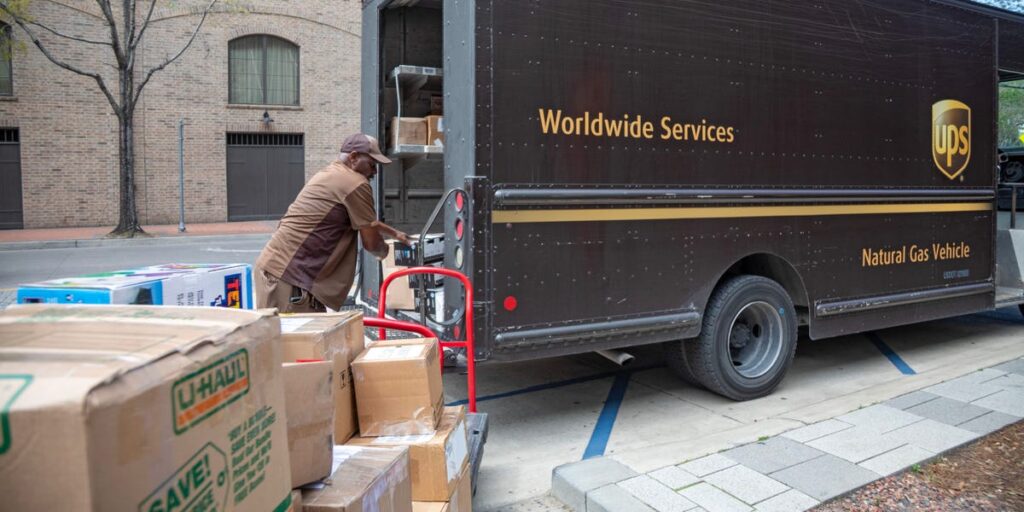Some UPS customers say the shipping service is applying the wrong tariff to US-bound shipments.
In some cases, the customers said UPS sent them bills that tariff their shipments at up to 200% — the US duty rate for aluminum from Russia, and one of the highest tariffs that American customs officials can charge. The problem: The customers said their shipments don’t contain that metal, and getting a hold of someone at UPS to contest the charge is laborious, if possible at all.
Business Insider spoke to four UPS customers who are dealing with tariff bills that are higher than they were expecting. On Reddit, users in a UPS channel also posted bills that suggested UPS charged the Russian aluminum rate for a variety of goods.
The tariff mix-ups are another element of an apparent logistical snarl affecting UPS shipments bound for the US. Business Insider previously reported that the company told some customers that their packages were marked for destruction, often after sitting for days or weeks at a UPS facility.
Sean Dickinson, the facilities manager at SoCal Swords, said his company ordered a pair of high-carbon steel recreational swords from an artisan in Canada. About a week later, SoCal Swords got a bill for a $2,074 tariff on a shipment worth $1,098.
Dickinson found that UPS categorized the Canadian steel swords as eight pounds of bulk aluminum from Russia. In an email shared with Business Insider, the supplier who made the swords said they had shipped the recreational swords using a code for outdoor sporting equipment. However, the shipment seemed to be processed under a different category.
Now, Dickinson is concerned that UPS won’t release the shipment without being paid at the higher rate.
A UPS spokesperson declined to comment on the seemingly inaccurate tariff rates.
“UPS uses customer-supplied information about a shipment to calculate the duties and fees, based on regulations from CBP and other government agencies,” a spokesperson for UPS told Business Insider.
The process, which UPS calls “rating” a shipment, considers the specific items being imported and which country they originated in, the spokesperson said. The spokesperson said UPS brokers, which help clear shipments at customs, are “highly trained and use sophisticated technology to ensure accuracy in calculating the appropriate duty and fees due.”
SoCal Swords isn’t the only company facing the Russian aluminum tariff on shipments that didn’t contain the metal.
Kunal Sharma, an auto-parts business owner based in Canada, shipped a carbon-fiber car part worth about $200 to a US customer. The package made it to the US, but not without a customs bill for about $400.
“He’s like, ‘They’re saying this is Russian aluminum,'” Sharma said, recounting his conversation with the customer after the delivery arrived. “There’s not any aluminum in this product.”
Matt Collinson, the president of a Canada-based company called Mr. Speedometer, said he began experiencing erroneous tariff charges on his US-bound shipments shortly after the end of the de minimis tariff exemption in late August.
Since then, as he’s sought to ship speedometer and taximeter parts to clients in the US, he said he’s had packages returned to him by UPS, frustrated customers hit with unexpected tariffs, and some packages simply left in limbo.
Collinson said the challenges have cost his business thousands of dollars in reshipping costs and tariff fees, and countless hours spent on the phone. He also said he hasn’t experienced the erroneous charges with other carriers, and that UPS hasn’t explained what’s going on.
“It’s almost as if UPS’s system is so slammed that they don’t know how to handle the volume, or they just have people not knowing what they’re doing,” Collinson said. “A lot of stuff is clearly falling through the cracks.”
Collinson said that he’s encountering these erroneous charges despite providing the necessary paperwork for his shipments. In one instance, a customer in Oregon who purchased a $53 rotational cable for a Ford vehicle was hit with a 250% tariff charge, much of which came from the 200% Russian aluminum tariff charge, as shown in an invoice seen by Business Insider. Collinson said the customer ultimately paid the fee because they needed the cable.
Some UPS customers say that their shipments have been hit with lower, though still incorrect, tariff rates.
Jim Legary, chief operating officer of Aquaventronics, a Canadian company that makes carnival games and related electronic equipment, told Business Insider that UPS has assessed the wrong tariff rate for some of his recent shipments to the US.
In late August, Legary’s Manitoba-based company sent some equipment that should have been imported to the US duty-free under the United States-Mexico-Canada Agreement. Instead, UPS said that the shipment would be tariffed at 35% and sent Legary a bill for about 1,100 Canadian dollars, an invoice seen by Business Insider shows.
Legary reached out to UPS, including writing to some executives, before getting a response from UPS’s global brokerage division in September. The company promised to investigate why UPS wasn’t handling his shipments as duty-free and how he could get reimbursements. He told Business Insider that he hasn’t heard from UPS yet on those issues.
“Why on this entry is it being applied? That’s anybody’s guess,” he said of the 35% tariff. “I’m assuming it’s literally just a straight-up error.”
Do you have a story to share about UPS or tariffs? Contact this reporter at abitter@businessinsider.com or 808-854-4501.
Read the full article here


